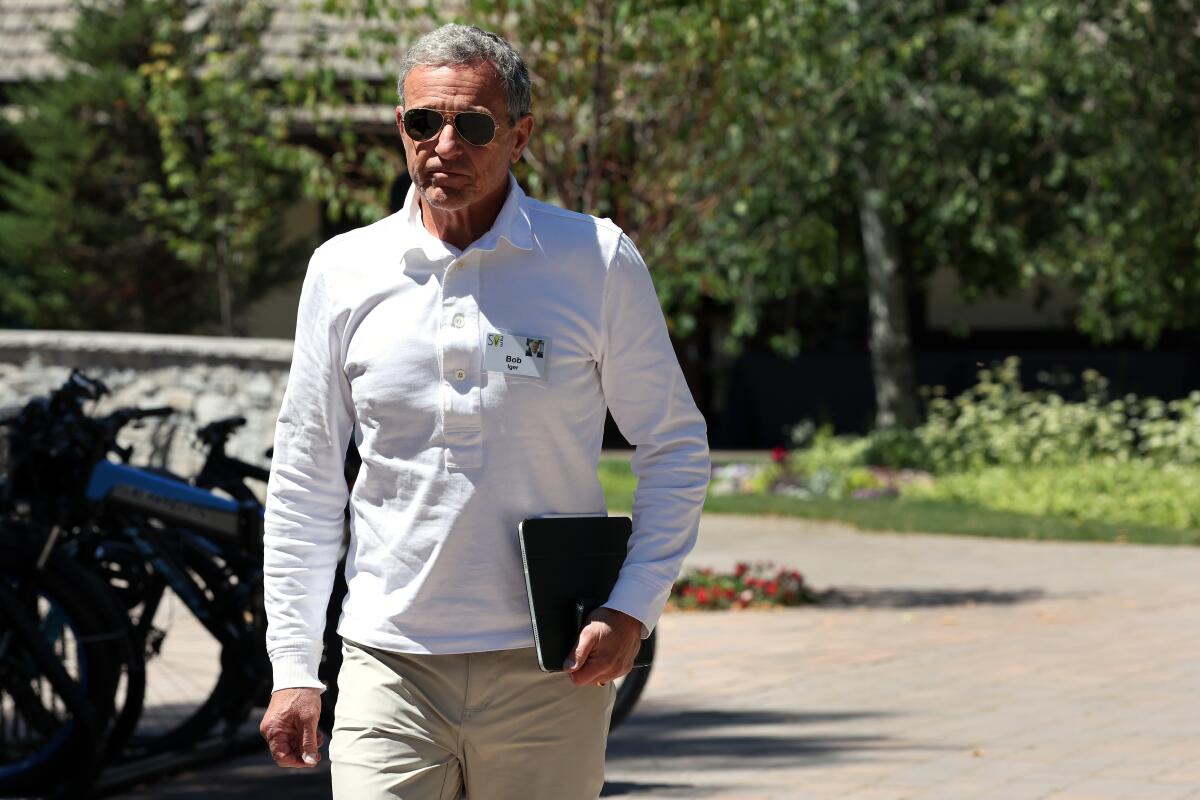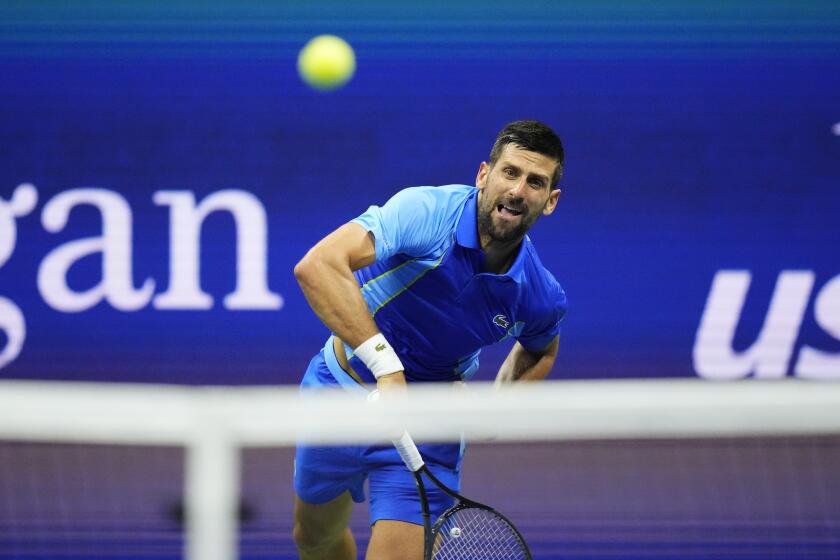Behind Disney’s Spectrum blackout: A ‘proxy battle’ for the future of television

- Share via
Walt Disney Co. Chief Executive Bob Iger has made no secret of his company’s plans to eventually offer ESPN channels directly to consumers, bypassing its long-standing partners — the cable and satellite TV providers.
“We have a great brand, we’ve had a great business,” Iger said during a mid-July appearance on CNBC from Sun Valley, Idaho. “There is an inevitability ... to taking ESPN direct to consumers. We haven’t said when, but we do know that it will happen.”
Back in Stamford, Conn., Charter Communications executives took notice. Charter’s four-year agreement to distribute two dozen Disney channels, including ESPN, ABC stations and FX, was set to expire soon after, on Aug. 31. Iger’s comments signaled another example of a major programmer prioritizing its streaming business at the expense of the pay-TV bundle, which continues to provide a vital source of revenue despite the ravages of cord-cutting.
Disney’s goal of offering ESPN directly to sports fans was one of several factors that led to Thursday’s blackout of the Burbank entertainment giant’s channels for Charter Spectrum’s 14.8 million customer homes nationwide, according to people close to the two companies who were not authorized to speak publicly.
“Most of these disputes feel like a spitting contest between two companies jockeying for leverage in a negotiation,” said Paul Verna, principal analyst for Insider Intelligence. “But this one feels more like it’s a proxy battle for the future of pay TV.”
It’s unclear how long the dispute might last. Charter executives say that without major concessions, they are unwilling to sign another multiyear pact that would obligate them to pay even more for the right to carry ESPN and other channels when Disney is trying to become one of Spectrum’s biggest competitors in the video channel space.
ESPN already is the most expensive channel, costing distributors about $9 a month per subscriber home.
Charter has largely agreed to Disney’s financial demands but has insisted on gaining more leeway in how it offers Disney’s channels and streaming apps, including ESPN+, to its customers, the knowledgeable people said.
The carriage fee dispute means that millions of Spectrum customers will go without “Jeopardy!,” U.S. Open tennis coverage and football on ESPN. The cutoff coincided with the start of a highly anticipated college football game between Utah and Florida.
The switch to streaming by several entertainment companies, including Disney, Warner Bros. Discovery and Paramount Global, has become a sore spot for Charter and other pay-TV executives who feel their companies and loyal customers are being short-changed.
Pay-TV operators have accused media companies of destroying the video channel ecosystem by ratcheting up the fees they charge for their programming, leading to more pay-TV customer defections, which then leads to higher prices for the subscribers that remain.
“We’ve seen complete upheaval in how consumers are buying and consuming video content,” said Steven Schiffman, a former senior media executive and a current instructor at Georgetown University’s McDonough School of Business. “The money that the distributors pay for these channels is relevant, but this dispute is more about giving Charter flexibility to offer Disney and ESPN content any way they think their customers want it.”

Programmers’ practices have hastened the demise of the pay-TV landscape, according to Charter Chief Executive Christopher Winfrey and other distribution executives.
Entertainment companies first sold their valuable reruns like “Breaking Bad,” “Friends” and “The Office” to Netflix, enabling the streaming service to grow into a global giant. When executives recognized they were harming their own businesses by fueling a competitor, they clawed back streaming rights to their popular shows and developed even more expensive ones, like Disney’s “The Mandalorian,” to run exclusively on their own streaming platforms.
“All the while, programmers have asked linear video customers to fund their mistakes,” Winfrey told analysts during a conference call, in which he threatened that Charter could walk away from the business of selling video channels, if necessary.
The dispute has been brewing for years, analysts said.
“This is a risky game that these [entertainment] companies were playing ... by depriving the Pay TV bundle that still paid most of their bills of its last scraps of compelling exclusive content,” media analyst Michael Nathanson wrote in a recent report, adding that Disney’s executives “repeated public ruminations about turning ESPN into a [direct-to-consumer] service ... have understandably made distributors nervous.”
Charter — whose Spectrum brand is Southern California’s largest pay-TV service — increasingly relies on its more profitable businesses, including broadband internet and wireless phone service, amid the challenges and soaring costs in pay-TV. While offering video channels remains profitable, the margins are shrinking, analysts said.
A day after extending his contract as Walt Disney Co.’s CEO, Iger said he is open to spinning off ABC Television and taking on a partner for ESPN.
Consumers in more than 25 million pay-TV homes — a quarter of the total from about five years ago — have dropped their subscriptions. Many have shifted their viewing to lower-cost streaming apps, but sports fans largely have had to subscribe to a pay-TV bundle to see their favorite teams.
Disney said that 71% of Charter subscribers tune in to Disney’s networks or one of its owned stations in an average month. Charter executives have said the number is much lower. During its presentation to analysts, Charter said about 25% of its customers are “regularly engaged” with Disney channels.
“Disney deeply values its relationship with its viewers and is hopeful Charter is ready to have more conversations that will restore access to its content to Spectrum customers as quickly as possible,” Disney said in a statement.
Charter has demanded that Disney allow it to offer ad-supported streaming services, including Disney+ and ESPN+, to its customers at no additional charge. Disney has balked, saying Charter is making unrealistic demands for terms that no other multi-channel video distributor has received.
People close to Disney point to a deal it negotiated two years ago with Philadelphia-based Comcast, in which the cable provider offers its customers ESPN+ on its app-aggregation platform, X-1, for $9.99 a month.
“Charter has made a plea that its customers should get those services for free, which, of course, Disney is never going to accept,” Verna said.
Long known as the ‘Worldwide Leader in Sports,’ ESPN is grappling with cord-cutting, rising rights fees and skepticism from Wall Street.
On the flip side, Disney’s stance on offering ESPN directly to consumers — which Iger has described as inevitable — is a big issue for Charter.
“The idea that somebody has publicly said repeatedly that [ESPN] is going to go direct-to-consumer, and you’re signing up to that type of long-term deal — that’s untenable,” Winfrey said.
Should Charter make good on its threat to permanently walk away from offering Disney-owned channels to its customers, Disney would lose billions of dollars a year in programming fees. Charter has said it planned to pay Disney $2.2 billion this year for programming.
Disney is loath to forgo the revenue from Charter, particularly when it is facing severe challenges in other parts of its business, including the film and television writers’ and actors’ strikes, which have crippled movie and TV production since May.
“This dispute exposes how risky the business model is for both of these companies when it comes to pay TV,” Verna said. “Disney is caught between a rock and a hard place.”
Should Charter prevail, other pay-TV providers may similarly draw hard lines during their carriage negotiations with Disney, leading to further revenue woes.
In addition, Disney is heading into negotiations this fall with Comcast over buying full control of streaming service Hulu. The two companies haven’t agreed on the price Disney would pay for Comcast’s one-third stake. Under a previous deal, negotiated four years ago, Disney would have to pay Comcast at least $9 billion. Comcast is pressing for more.
Millions of DirecTV customers lost access to Nexstar channels after the two companies failed to agree to a new distribution contract by a Sunday night deadline.
Over the weekend, Disney began promoting its Hulu+ Live TV service, which includes ABC stations and ESPN streams, to Spectrum customers unhappy about missing college football, the U.S. Open tennis championships or their local ABC station broadcasts of “Jeopardy!” and “Wheel of Fortune.”
Charter’s strategy also carries risks.
Huber Research Partners analyst Douglas M. Arthur speculated in a report that Charter might be bluffing about ditching the TV business. The cable company has almost $100 billion in debt, and its video channels business represents almost a third of its total revenue.
“Exit video?” Arthur wrote. “We’re not buying it.”
But other analysts have said that Charter could lose more subscribers if it agrees to Disney’s demands, because costs for remaining subscribers would increase.
Charter also is facing angry customers. The cable company has provided $15 credits to subscribers who’ve called to complain about the outage.
In Florida, a Tampa woman on Tuesday filed a federal class action lawsuit accusing Charter of breaching its contract with subscribers by failing to broadcast last week’s football game between the University of Florida and the University of Utah.
“Football fans across the country experienced a ‘Lucy taking the football away from Charlie Brown’ moment as Spectrum pulled the football game,” according to Jen Gonzalez’s lawsuit.
Winfrey said the companies had a narrow window to reach a deal. More viewers could get fed up and switch to a new service before a high-profile “Monday Night Football” game next week, when Aaron Rodgers makes his regular-season debut for the New York Jets in a game against the Buffalo Bills. New York is one of Charter’s largest pay-TV markets.
“It’s a really tough spot for Iger and other CEOs who are having to adjudicate the decline of the most profitable business model in television history,” Schiffman said.
More to Read
Inside the business of entertainment
The Wide Shot brings you news, analysis and insights on everything from streaming wars to production — and what it all means for the future.
You may occasionally receive promotional content from the Los Angeles Times.















